#license dungeons and dragon
Text
So, what is the OGL and why are DnD creators thoroughly screwed?
Tumblr has not been doing a great job at talking about this, but:
With OneDnD, Wizards of the Coast has decided to update the Open Game License (OGL). Said license is what allowed people to create homebrew DnD content and sell it, and even larger companies to use certain sorts of content. Pathfinder, for example, is built on said OGL. This also allows streamers and artists to exist and benefit from said content.
With OneDnD (sometimes called “dnd 6e”), WOTC wants to create a much more restrictive OGL, which will, amongst other things:
Make WOTC take a cut for any DnD-related work (according to Kickstarter, a whole 25% of the benefits)
Let WOTC cancel any project related to DnD up to their discretion
Let WOTC take ANY content made based on their system, and re-sell it without crediting you, or giving you a single cent
And most importantly, revoke the old OGL, which will harm any company or game system that used it as a base, such as Pathfinder. And it means they GET ownership over any homebrew content you may have done for 5e in the past!
It’s important to note that OGLs are supposedly irrevocable. They were planning to use it for OneDnD initially, but they want to apply it retroactively to 5e, somehow. Which is illegal, but lawyers have mentioned there’s a chance they may get away with it given the wording.
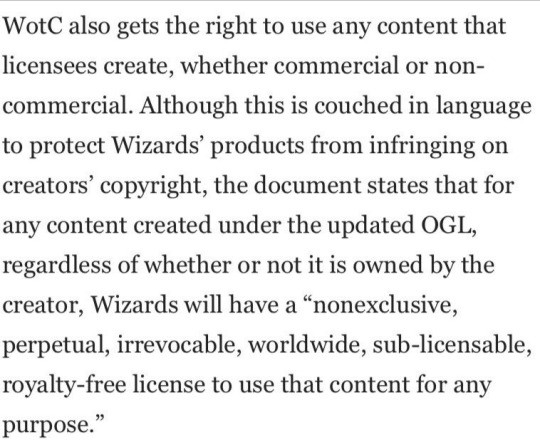
This means that anything you make based on DnD (A homebrew item? A character drawing? Even music, according to them?), can get taken and used as they deem appropiate.
These news come from a leak of the OGL, which have been confirmed by multiple reputable sources (including Kickstarter, which has confirmed that WOTC already talked with them about this), and was planned to be released next week.
So, what can we do?
Speak against it. Share the word. Reblog this post. Let people know. Tumblr hasn’t been talking much about this matter, but it’s VERY important to let people know about what is WOTC bringing.
Boycott them. Do not buy their products. Do not buy games with their IP. Do not watch their movie. CANCEL your DnD Beyond subscription. (Btw, they ARE planning to release more subscription services too!). They do not care about the community, but they care about the money. Make sure to speak through it.
And maybe consider other TTRPG systems for the time being, Pathfinder’s Paizo has been much nicer to the community, their workers are unionized and are far more healthy overall
#dnd#wotc#wizards of the coast#open gaming license#ogl#dnd5e#dnd 5e#homebrew#ttrpg#pathfinder#dungeons and dragons#d&d
28K notes
·
View notes
Text
youtube
Finalmente un Game Talks dedicato ai giochi di ruolo,, oggi parleremo di La Notte Eterna: un'ambientazione inedita per Dungeons and Dragons, creata da Jason R. Forbus.
Jason R. Forbus ci introdurrà al mondo che ha creato per La Notte Eterna: un mondo su cui non sorge il sole da oltre 161 anni, dove le creature che lo abitano si sono dovute adattare per sopravvivere; in un lavoro di quasi 20 anni Jason R. Forbus ha costruito per La Notte Eterna un mondo complesso e coerente, ponendo grazie attenzione a gli aspetti sociali e culturali di quel mondo in tutto perfettamente coronato da nuove meccaniche perfette per dare ai dungeon master nuove possibilità per le proprie campagne di Dungeons And Dragons.
Scopriremo assieme i 3 manuali de La Notte Eterna che poteranno essere finanziati su Kick Starter a partire dal primo Febbraio e daremo anche un'occhiata e a tutto il materiale approntato da Ali Ribelli e Jason R. Forbus per tutti coloro che vorranno partecipare al crowdfunding: dadi dedicati, schermo del dungeon master, miniature, mappa su tessuto ed una scatola il lego il tutto realizzato con una cura maniacale.
Affronteremo anche la questione della Open Gaming License che sta preoccupando tutte le community di Dungeons and Dragons,, spoiler Jason non è preoccupato e comunque pronto ad ogni evenienza.
@lanotteeternafor5e è un ambientazione per Dungeons and Dragons 5.0 che sarà possibile finanziare su Kick Starter a partire dal primo febbraio creata da Jason R. Forbus per @AliRibelli
Tutti i link e le info della la campagna KickStarter de La Notte Eterna:
https://linktr.ee/LaNotteEterna
Seguimi sui miei social:
https://www.facebook.com/AroundThe7able/
https://twitter.com/AroundThe7able
https://www.instagram.com/around_thetable/
http://aroundtable.tumblr.com/
#Around the table#dnd#La Notte Eterna#dungeons and dragons#ambientazione per Dungeons and Dragons#giocare a dungeons and dragons#game#scrivere avventure per Dungeons and Dragons#license dungeons and dragon#recensioni#dungeons and dragons 5.0#board#giochi#gioco di ruolo#come fare il dungeon master#recensione#consigli per dungeon master#board games#board game#dungeons and dragon kickstarter#boardgame#giocatori#D&D#d&d trailer#come giocare a D&D#Kick starter#Youtube
1 note
·
View note
Text
The thing is, D&D is not a game.
I know that sounds insane, but hear me out: D&D is not a game, it is a games console. You don't actually "play D&D." You play "Dragon Heist" or "Tomb of Annihilation" or "Ghosts of Saltmarsh" or "your GM's homebrew campaign" or "the plot of Critical Role Season 1 reconstructed from memory" on D&D.
For quite a long while now - possibly literal decades - D&D hasn't even been the best games console, but it's been "the one everyone knows about" and "the one my friends have" and in fact it's "the one whose name is almost synonymous with the entire medium of TTRPGs," like how "Nintendo" or "Playstation" could just mean "games console" to people who didn't understand games consoles. They might not have heard of a "tabletop roleplaying game," but most people have heard of "Dungeons & Dragons."
For this extended metaphor, D&D is Nintendo back in the 90s, or Playstation in the 2000s. Sometimes you say "oh let's go to my house and play Nintendo" or "c'mon dude I wanna play Playstation" but you're not actually playing Nintendo or Playstation, you're playing Resident Evil or Super Mario Bros or Jurassic Park or Metal Gear Solid or whatever on a Nintendo or a Playstation.
Now, this metaphor is going to get even more tortured, but remember how when the PS2 and the original X-Box came out, they used a standardised DVD format, but the Nintendo console in that generation, the Gamecube, used discs but they were this proprietary tiny little disc format that they had control over? That essentially meant that it was really difficult to make third party titles for the Gamecube that did literally anything that Nintendo didn't want them to do, and also essentially gave Nintendo an even greater ability to skim money off the top of any sales?
So that must've seemed like a smart business decision in their heads. But the PS2 and the X-Box used DVDs. This was a standardized format which gave Microsoft and Sony way less control over who made games for their consoles, but that actually turned out to be a good thing for gaming, because it meant that the breadth of games that you could play on their consoles was massively increased even if some of them were games Microsoft and Sony didn't really approve of. (Also it's worth nothing that the PS2 and the X-Box could just play DVDs, which meant if your household was on a budget, you didn't need a separate DVD player - your games console could do it for you! This was actually a huge selling point!)
What Wizards are currently trying to do now is kinda-sorta the equivalent of Sony suddenly announcing that the PS5 will only accept a proprietary cartridge format they hold the patent on, will control the content of and charge money for the construction of. This possibly seems like it could be a moneymaker in your head because you hold market dominance (apparently the PS5 has 30 million units shipped compared to X-Box Series X 20 million units) and so many people make games for your console, but what it actually means is game devs and publishers will abandon your product. If it takes so much more work, the scope of what they're allowed to do is so much more limited and they're going to make less money off of it, they just won't bother. They'll go make games for the X-Box or PC instead.
To use another computer metaphor, D&D is Windows - it might not be the best system but it's the system most people are familiar with and so it gets the most stuff made for it, but there's is an upper limit on the bullshit people will take before they decide fuck it and get an Apple or learn how Linux works.
TTRPG systems are a weird product because you're not selling people a game, you're selling people a method to play a game. All the actual games are created by the community - even prewritten campaigns needs to be executed via a game master. Trying to skim money off the community will mean they'll eventually give up on you.
#open gaming license#dungeons and dragons#ogl#ogl 1.1#opendnd#wizards of the coast#one dnd#d&d#dnd#tabletop gaming#tabletop roleplaying games#ttrpgs
11K notes
·
View notes
Text
Good riddance to the Open Gaming License
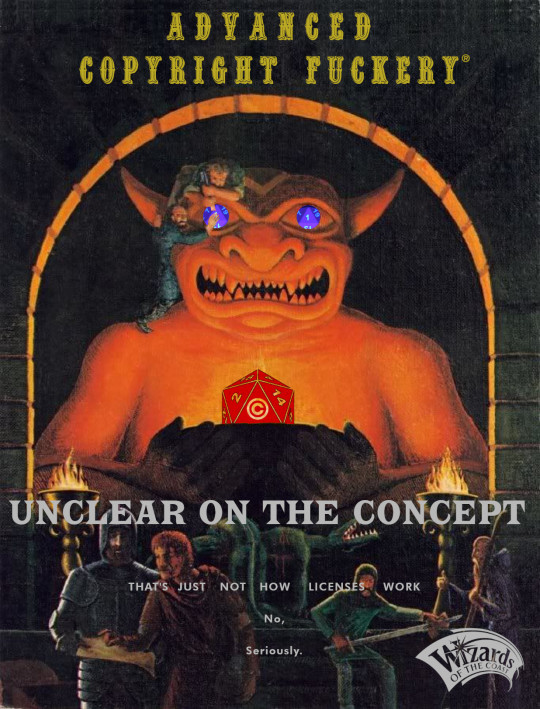
Last week, Gizmodo’s Linda Codega caught a fantastic scoop — a leaked report of Hasbro’s plan to revoke the decades-old Open Gaming License, which subsidiary Wizards Of the Coast promulgated as an allegedly open sandbox for people seeking to extend, remix or improve Dungeons and Dragons:
https://gizmodo.com/dnd-wizards-of-the-coast-ogl-1-1-open-gaming-license-1849950634
The report set off a shitstorm among D&D fans and the broader TTRPG community — not just because it was evidence of yet more enshittification of D&D by a faceless corporate monopolist, but because Hasbro was seemingly poised to take back the commons that RPG players and designers had built over decades, having taken WOTC and the OGL at their word.
Gamers were right to be worried. Giant companies love to rugpull their fans, tempting them into a commons with lofty promises of a system that we will all have a stake in, using the fans for unpaid creative labor, then enclosing the fans’ work and selling it back to them. It’s a tale as old as CDDB and Disgracenote:
https://en.wikipedia.org/wiki/CDDB#History
(Disclosure: I am a long-serving volunteer board-member for MetaBrainz, which maintains MusicBrainz, a free, open, community-managed and transparent alternative to Gracenote, explicitly designed to resist the kind of commons-stealing enclosure that led to the CDDB debacle.)
https://musicbrainz.org/
Free/open licenses were invented specifically to prevent this kind of fuckery. First there was the GPL and its successor software licenses, then Creative Commons and its own successors. One important factor in these licenses: they contain the word “irrevocable.” That means that if you build on licensed content, you don’t have to worry about having the license yanked out from under you later. It’s rugproof.
Now, the OGL does not contain the word “irrevocable.” Rather, the OGL is “perpetual.” To a layperson, these two terms may seem interchangeable, but this is one of those fine lawerly distinctions that trip up normies all the time. In lawyerspeak, a “perpetual” license is one whose revocation doesn’t come automatically after a certain time (unlike, say, a one-year car-lease, which automatically terminates at the end of the year). Unless a license is “irrevocable,” the licensor can terminate it whenever they want to.
This is exactly the kind of thing that trips up people who roll their own licenses, and people who trust those licenses. The OGL predates the Creative Commons licenses, but it neatly illustrates the problem with letting corporate lawyers — rather than public-interest nonprofits — unleash “open” licenses on an unsuspecting, legally unsophisticated audience.
The perpetual/irrevocable switcheroo is the least of the problems with the OGL. As Rob Bodine— an actual lawyer, as well as a dice lawyer — wrote back in 2019, the OGL is a grossly defective instrument that is significantly worse than useless.
https://gsllcblog.com/2019/08/26/part3ogl/
The issue lies with what the OGL actually licenses. Decades of copyright maximalism has convinced millions of people that anything you can imagine is “intellectual property,” and that this is indistinguishable from real property, which means that no one can use it without your permission.
The copyrightpilling of the world sets people up for all kinds of scams, because copyright just doesn’t work like that. This wholly erroneous view of copyright grooms normies to be suckers for every sharp grifter who comes along promising that everything imaginable is property-in-waiting (remember SpiceDAO?):
https://onezero.medium.com/crypto-copyright-bdf24f48bf99
Copyright is a lot more complex than “anything you can imagine is your property and that means no one else can use it.” For starters, copyright draws a fundamental distinction between ideas and expression. Copyright does not apply to ideas — the idea, say, of elves and dwarves and such running around a dungeon, killing monsters. That is emphatically not copyrightable.
Copyright also doesn’t cover abstract systems or methods — like, say, a game whose dice-tables follow well-established mathematical formulae to create a “balanced” system for combat and adventuring. Anyone can make one of these, including by copying, improving or modifying an existing one that someone else made. That’s what “uncopyrightable” means.
Finally, there are the exceptions and limitations to copyright — things that you are allowed to do with copyrighted work, without first seeking permission from the creator or copyright’s proprietor. The best-known exception is US law is fair use, a complex doctrine that is often incorrectly characterized as turning on “four factors” that determine whether a use is fair or not.
In reality, the four factors are a starting point that courts are allowed and encouraged to consider when determining the fairness of a use, but some of the most consequential fair use cases in Supreme Court history flunk one, several, or even all of the four factors (for example, the Betamax decision that legalized VCRs in 1984, which fails all four).
Beyond fair use, there are other exceptions and limitations, like the di minimis exemption that allows for incidental uses of tiny fragments of copyrighted work without permission, even if those uses are not fair use. Copyright, in other words, is “fact-intensive,” and there are many ways you can legally use a copyrighted work without a license.
Which brings me back to the OGL, and what, specifically, it licenses. The OGL is a license that only grants you permission to use the things that WOTC can’t copyright — “the game mechanic [including] the methods, procedures, processes and routines.” In other words, the OGL gives you permission to use things you don’t need permission to use.
But maybe the OGL grants you permission to use more things, beyond those things you’re allowed to use anyway? Nope. The OGL specifically exempts:
Product and product line names, logos and identifying marks including trade dress; artifacts; creatures characters; stories, storylines, plots, thematic elements, dialogue, incidents, language, artwork, symbols, designs, depictions, likenesses, formats, poses, concepts, themes and graphic, photographic and other visual or audio representations; names and descriptions of characters, spells, enchantments, personalities, teams, personas, likenesses and special abilities; places, locations, environments, creatures, equipment, magical or supernatural abilities or effects, logos, symbols, or graphic designs; and any other trademark or registered trademark…
Now, there are places where the uncopyrightable parts of D&D mingle with the copyrightable parts, and there’s a legal term for this: merger. Merger came up for gamers in 2018, when the provocateur Robert Hovden got the US Copyright Office to certify copyright in a Magic: The Gathering deck:
https://pluralistic.net/2021/08/14/angels-and-demons/#owning-culture
If you want to learn more about merger, you need to study up on Kregos and Eckes, which are beautifully explained in the “Open Intellectual Property Casebook,” a free resource created by Jennifer Jenkins and James Boyle:
https://web.law.duke.edu/cspd/openip/#q01
Jenkins and Boyle explicitly created their open casebook as an answer to another act of enclosure: a greedy textbook publisher cornered the market on IP textbook and charged every law student — and everyone curious about the law — $200 to learn about merger and other doctrines.
As EFF Senior Staff Attorney Kit Walsh writes in her must-read analysis of the OGL, this means “the only benefit that OGL offers, legally, is that you can copy verbatim some descriptions of some elements that otherwise might arguably rise to the level of copyrightability.”
https://www.eff.org/deeplinks/2023/01/beware-gifts-dragons-how-dds-open-gaming-license-may-have-become-trap-creators
But like I said, it’s not just that the OGL fails to give you rights — it actually takes away rights you already have to D&D. That’s because — as Walsh points out — fair use and the other copyright limitations and exceptions give you rights to use D&D content, but the OGL is a contract whereby you surrender those rights, promising only to use D&D stuff according to WOTC’s explicit wishes.
“For example, absent this agreement, you have a legal right to create a work using noncopyrightable elements of D&D or making fair use of copyrightable elements and to say that that work is compatible with Dungeons and Dragons. In many contexts you also have the right to use the logo to name the game (something called “nominative fair use” in trademark law). You can certainly use some of the language, concepts, themes, descriptions, and so forth. Accepting this license almost certainly means signing away rights to use these elements. Like Sauron’s rings of power, the gift of the OGL came with strings attached.”
And here’s where it starts to get interesting. Since the OGL launched in 2000, a huge proportion of game designers have agreed to its terms, tricked into signing away their rights. If Hasbro does go through with canceling the OGL, it will release those game designers from the shitty, deceptive OGL.
According to the leaks, the new OGL is even worse than the original versions — but you don’t have to take those terms! Notwithstanding the fact that the OGL says that “using…Open Game Content” means that you accede to the license terms, that is just not how contracts work.
Walsh: “Contracts require an offer, acceptance, and some kind of value in exchange, called ‘consideration.’ If you sell a game, you are inviting the reader to play it, full stop. Any additional obligations require more than a rote assertion.”
“For someone who wants to make a game that is similar mechanically to Dungeons and Dragons, and even announce that the game is compatible with Dungeons and Dragons, it has always been more advantageous as a matter of law to ignore the OGL.”
Walsh finishes her analysis by pointing to some good licenses, like the GPL and Creative Commons, “written to serve the interests of creative communities, rather than a corporation.” Many open communities — like the programmers who created GNU/Linux, or the music fans who created Musicbrainz, were formed after outrageous acts of enclosure by greedy corporations.
If you’re a game designer who was pissed off because the OGL was getting ganked — and if you’re even more pissed off now that you’ve discovered that the OGL was a piece of shit all along — there’s a lesson there. The OGL tricked a generation of designers into thinking they were building on a commons. They weren’t — but they could.
This is a great moment to start — or contribute to — real open gaming content, licensed under standard, universal licenses like Creative Commons. Rolling your own license has always been a bad idea, comparable to rolling your own encryption in the annals of ways-to-fuck-up-your-own-life-and-the-lives-of-many-others. There is an opportunity here — Hasbro unintentionally proved that gamers want to collaborate on shared gaming systems.
That’s the true lesson here: if you want a commons, you’re not alone. You’ve got company, like Kit Walsh herself, who happens to be a brilliant game-designer who won a Nebula Award for her game “Thirsty Sword Lesbians”:
https://evilhat.com/product/thirsty-sword-lesbians/
[Image ID: A remixed version of David Trampier's 'Eye of Moloch,' the cover of the first edition of the AD&D Player's Handbook. It has been altered so the title reads 'Advanced Copyright Fuckery. Unclear on the Concept. That's Just Not How Licenses Work. No, Seriously.' The eyes of the idol have been replaced by D20s displaying a critical fail '1.' Its chest bears another D20 whose showing face is a copyright symbol.]
#pluralistic#copyfraud#wizards of the coast#wotc#dungeons and dragons#d&d#ogl#open gaming license#eff#fair use#kit walsh#consideration#licenses
8K notes
·
View notes
Text
the changes to the dnd game license are SUCH a perfect example of corporate greed. imagine having such a huge and dedicated fanbase buying your product that podcasts spring up for it, and instead of recognising how lucky you are for that free publicity you try to claim 25% of their profits - which will almost certainly prevent many creators from using 5e as their game of choice. and then, on top of that, you implement an anti-homebrew policy.
read more here. I haven't seen anybody in fandom talking about this yet and if you enjoy anything derived from dnd - any TTRPG, any live play podcast, any creators - this will affect you. sign the open letter. tweet at them (#opendnd). send them an email. don't let them break the spirit of creativity that underpins TTRPGS.
#i defo wouldnt have got into dnd if not for podcasts#dnd#dungeons and dragons#if you haven't heard of this theyre basically trying to fuck over all dnd content creators by claiming their profits#and also the new license looks like it could be used to crack down on homebrew content thats not officially endorsed#opendnd
4K notes
·
View notes
Text
For those late to the party who want to know what the hell is going on with #OpenDnD, #StoptheSub, #DnDBegone etc, and why everyone is cancelling DnDBeyond subscriptions, I tried to do a crash course as succinctly as possible. OpenDnD.Games is a great resource for more in-depth details, and if you wish to do so, you can cancel your DnDBeyond subscription through this direct link (as there have been many reporting trouble in locating where to do so).
Edit: Tweaked the very first detail below, as someone reminded me it was not a wholly accurate statement as I had initially written it. Apologies to everyone who already reblogged the first version of this :')
Hasbro acquired Wizards of the Coast (WotC) some time ago, but recently they got new leadership who said in an interview that they see D&D as "under-monetized". Hasbro is on the decline with finances, and WotC is its biggest cash cow. Why milk that cash cow through producing more content when you can instead revoke a legally irrevocable license that makes it impossible for 3rd party content creators to exist?
America loves a good monopoly. The old license that permitted the community to grow to what it is today was OGL1.0a, and without it, D&D would not be what it is right now, nor even close. They tried to shift to OGL1.1, a new license that is, in a word, PREDATORY. Horrific, nasty shit.
OGL1.1 was quietly sent to large creators to sign. It then got leaked. The community erupted. The backlash was loud and unanimous. WotC was radio silent for like two weeks. They finally gave a single-sentence "we'll explain soon" tweet on DnDBeyond's account. Then more silence.
A WotC employee reached out to large creators to blow the whistle on WotC. The source was verified, and they shared that WotC sees the community as an obstacle between them and their money, all they care about is bottom line, and they're delaying in hopes we forget and move on.
And also that they are mainly looking at DnDBeyond subscription cancelations to gauge the financial impact; they don't care about our sentiments, only our money. So everyone erupted into signal boosting for others to unsubscribe as the single and best way to make ourselves heard. Cue the mass unsubscribing.
Today (January 13th 2023), a shitty PR piece was posted on DnDBeyond full of blatant lies and, in my opinion, barely-contained saltiness. Right before that, though, OGL2.0 leaks came out; the tweaks they'd begrudgingly made following the backlash. 2.0 is basically just as bad as 1.1; they just spoke of it as being more changed than it was.
In other words, they keep bold-faced lying to a community of rules-lawyers who recreationally read fine print :)
Meanwhile, Paizo (creators of Pathfinder) has come to the rescue, vowing to release a truly open license that will allow everyone to continue pursuing the livelihoods they're passionate about; this is the Open RPG Creative License, or "ORC".
Canceling subscriptions immediately sends a potent message, even if you may have to resubscribe later for functionality in your games. You'll still have the remainder of your billing cycle to enjoy paid perks.
Everything's a little on fire, but I think we'll be okay ♥️
OGL1.0a was never meant to be revocable, as loudly stated in the past couple days by the very people who authored it. It is very likely that WotC is actually just bluffing and bullying, and is actually powerless to revoke it--something many lawyers more knowledgeable than myself seem to be suggesting. In which case, it is my greatest hope in all of this that 3rd party creators are able to continue doing what they love, with no further interruptions.
Remember: the majority of WotC and DnDBeyond employees feel the exact same way we do, but they don't have a choice. Hasbro is the enemy here. Be kind to each other, and know where blame should and should not be placed. If you want to stay up to speed, the account of @.DnD_Shorts seems to be a very active and informed voice, largely responsible for sharing the first leak. If Twitter makes you want to puke, I completely understand; DnD_Shorts also has a YouTube channel with frequent updates on the situation posted in video format.
It's cathartic to me to try to signal boost this stuff, and provide summaries that might help others stay informed. It helps me feel like I'm somehow able to affect these nasty things that are otherwise just inflicted onto lil guys in the community like myself.
However, this has been beyond exhausting and stressful. I'm going to start untangling myself and stepping back from posting about this issue so I can hopefully restore some of my own sanity.
It's been really crazy--in a good way--to see the power this community has when rallied together under a common threat. It makes me proud to be in that community.
At the end of the day, all TTRPGs are really just exercises in creativity and fun. The golden rule has always been and should always be that there is no right or wrong way to play, other than what suits you and those you play with. Likewise, no one should ever feel guilty or judged by others for playing one system over another. It's okay to like D&D5e despite all this. No matter how much they've tried, Wizards of the Coast cannot claim jurisdiction over the invaluable memories you've made, and what has become a creative outlet for countless people. Myself included.
Boycotting is a great way to be heard, since they only care about money. But continuing to use the content you have to play D&D5e is your prerogative, and hurts no one. Furthermore, it's also okay if you can't cancel your DnDBeyond subscription because you rely on it too heavily for your games. That doesn't make you a traitor. That doesn't estrange you from the community. DnDBeyond, at its core, is a great tool that is popular for a reason; it's the new leadership that is forcing it to become something it wasn't meant to be. One day, I hope to be able to resubscribe in good conscious, and I hope that day is soon.
To reiterate, if anyone's even read down this far... be kind to one another. Keep in mind that big enemies win when the party is divided. You can love or hate anything you want in the TTRPG sphere, but how you feel about it does not invalidate someone else feeling the opposite.
Be kind. Be patient. Be empathetic. We're already coming out on top.
#if youre considering taking an opposing stance to the community just to be contrarian or highIQ just. breathe.#the devil doesnt need as many advocates as he has honestly.#opendnd#stopthesub#dndbegone#dndbeyond#ogl#wotc#wizards of the coast#hasbro#dnd#dnd5e#ttrpg#paizo#pathfinder#onednd#dungeons and dragons#rpg#orc#open rpg license#openrpg#critical role#cr#daarka gekkers
957 notes
·
View notes
Photo
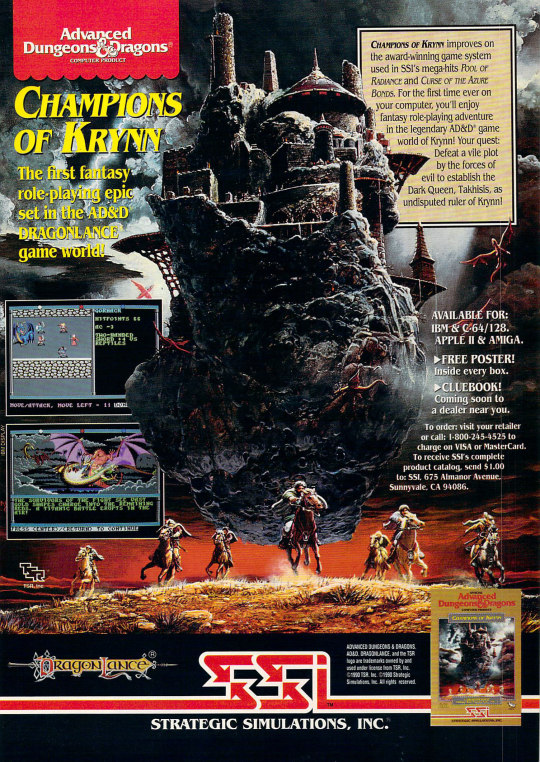
USA 1990
527 notes
·
View notes
Text
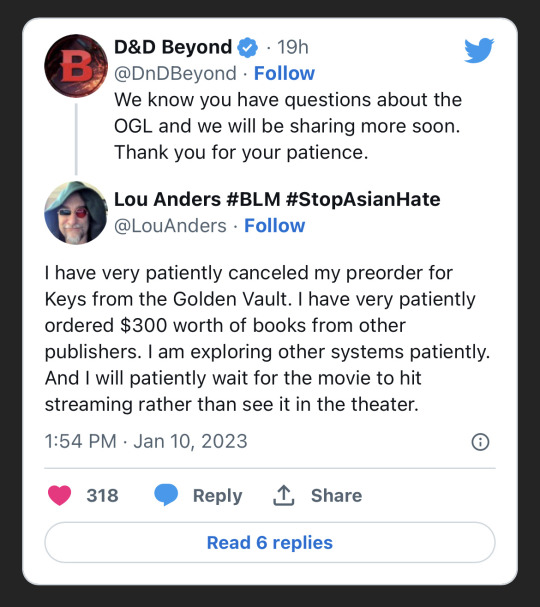

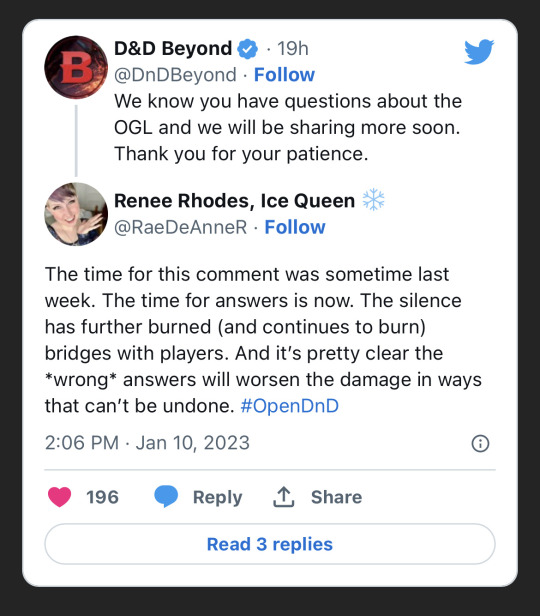
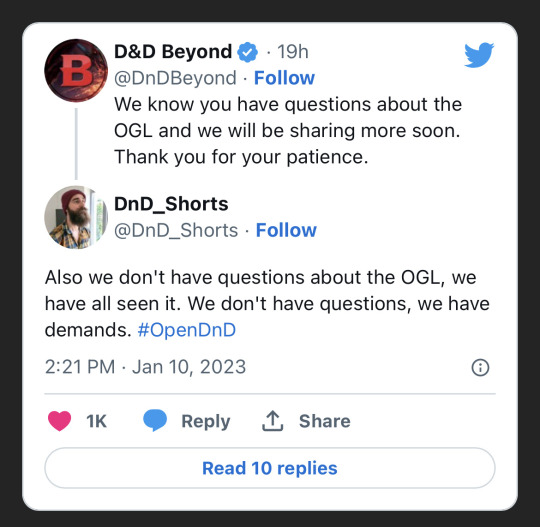
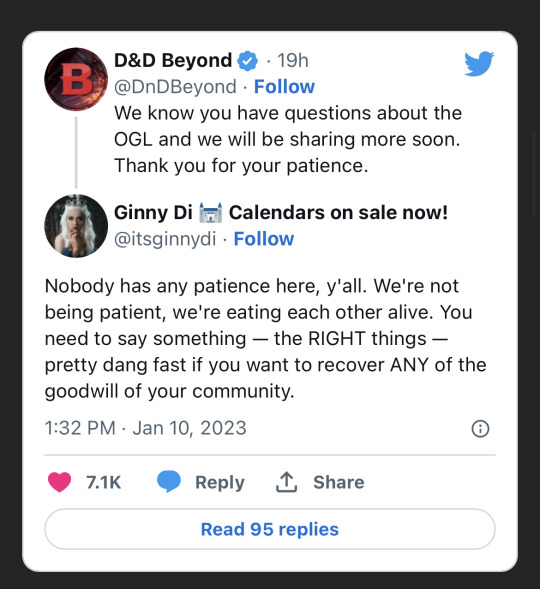
Oof 👏🏼👏🏼👏🏼
#ogl#srd#dungeons and dragons#d&d#ttrpg#twitter#dnd beyond#open game license#opendnd#ginny di#dnd shorts#wotc#wizards of the coast#hasbro
542 notes
·
View notes
Text

Kobold Press, one of the largest DnD creators, is creating their own system due to the recently announced changes to the Open Gaming License (OGL 1.1). Above is the video announcement on Twitter. Here's the blurb from the website:
As Dungeons & Dragons moves toward the 50th anniversary of the game, foundational changes are afoot in the tabletop roleplaying game arena. While we wait to see exactly what shape the Open Gaming License might take in this new era, Kobold Press is also moving forward with some clear-eyed work on work on a new Core Fantasy tabletop ruleset: available, open, and subscription-free for those who love it: Code Name — Project Black Flag. To receive future announcements and to register to playtest this ruleset, please sign up using this form.
When the new Open Gaming License and an updated System Reference Document are made public, Kobold Press will review the terms and consider whether they fit the needs of our audience and our business goals.
The kobolds are looking forward to the continued evolution of tabletop gaming, and we aim to play our part in making the game better. Rest assured Kobold Press intends to maintain a strong presence in the tabletop RPG community.
The form to sign up that is mentioned above is located here: https://koboldpress.com/kobold-press-announces-new-core-fantasy-experiment/
This could easily move the needle on how WoTC goes forward with this plan, but no matter what I think they've lost a lot of trust with the community.
#kobold press#dnd 5e#dungeons and dragons#wotc#wizards of the coast#dnd open gaming license#dnd news#dnd ogl
348 notes
·
View notes
Text
So... you put some points in DEX right? ...right??
-
[Video description: A person brings a book to a library desk and says Hi, can I check out this book? The librarian says oh sure. You just have to roll for it. The librarian offers the patron a D20 with a mischievous smile. The patron rolls. It is a one. She looks at the one in horror and then slowly up to the librarian, whose pleasant expression becomes a fierce grimace as he winds up to literally throw the book at her. The video cuts off abruptly. /description]
#jk we know all library lovers put all their points in INT and WIS#good luck out there#please imagine the baldur's gate 3 theme playing in the background. licensing music is expensive#critical fail#video#captioned video#described video#dnd#dungeons and dragons#libraries#public libraries#tumblrarians#tumblarians
28 notes
·
View notes
Text

Took some time yesterday to play with some character designs for the D&D campaign i'm DMing :}
Yorke belongs to @moist-car and Vesh is his big beefy boyfriend that we birthed together !!!
#dont worry about vergil's vest on yorke#it's artistic license#art#fanart#artists on tumblr#digital art#sketch#original character#dnd character#character design#character art#original art#character concept#d&d#dungeons and dragons#drow#dnd drow
37 notes
·
View notes
Link
(Check the link for the post itself! Here’s a screenshot of the same content available in the page, though)
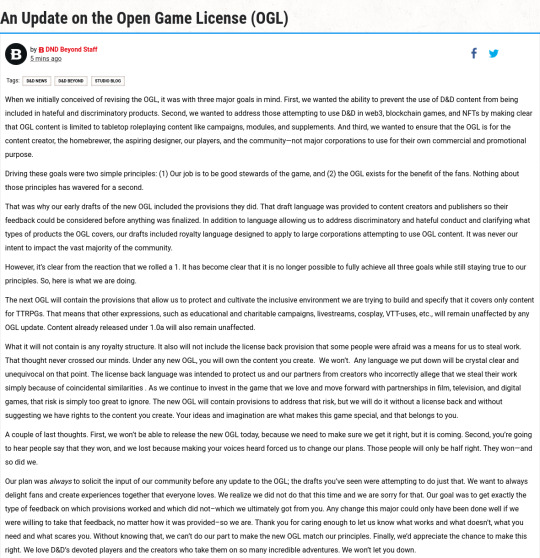
Wizards of the Coast has finally made an official statement about the new OGL, and as expected, it’s an attempt to douse the fire with sweet corpo speak. So, here’s some key points about it, so we don’t forget what actually happened.
They repeated thorough the letter that this was to avoid bigoted content. About three times. Don’t let them lie to you: This was NEVER about preventing bigoted content. (In fact, please remember that WOTC released the hadozee on 2022, and has a lot of unresolved sexual harassment case allegations)
They also mentioned the NFT thing. Again: This is another buzzword, given how nowadays most people dislike NFTs openly. It was NEVER about preventing NFTs
Most importantly: They are blatantly lying about the leaked OGL being “up to revision” and them having planned “to accept community feedback”. The leaked OGL was sent as it is to implied third parties, alongside with contracts. THEY FULLY PLANNED TO HAVE PEOPLE SIGN IT AS IT WAS.
They have been saying they’ll backpedal on some of the choices. DO NOT BELIEVE THEM until we see an actual readable OGL of whatever changes they are promising. They are trying to, desperately, calm down the storm.
KEEP pushing, in fact. Keep unsuscribing from DnD Beyond. Do not buy their products, don’t watch the movie, etc. If this PR stunt makes people suddenly calm down, they’ll try to get away with the OGL as it is.
Also, here’s some segments I want to highlight, just to show how thoroughly filled with horseshit they are:
And third, we wanted to ensure that the OGL is for the content creator, the homebrewer, the aspiring designer, our players, and the community—not major corporations to use for their own commercial and promotional purpose.
This one is probably a jab at Paizo, but they certainly didn’t care about all the third parties affected by this. The “aspiring designer”, the “homebrewer”, the “content creator” are all people who probably have a foot in the industry and are working with smaller TTRPG companies, or third parties. Most third parties have a very limited number of employees (or quite literally consist of just one person), and hire freelancers as needed. These were quite literally the most hurt by this new OGL. Let’s not forget they were content trying to put an end to that.
It also will not include the license back provision that some people were afraid was a means for us to steal work. That thought never crossed our minds. Under any new OGL, you will own the content you create. We won’t. Any language we put down will be crystal clear and unequivocal on that point. The license back language was intended to protect us and our partners from creators who incorrectly allege that we steal their work simply because of coincidental similarities.
They made a section in the OGL that allowed them to steal content. Of course, they are claiming that is not true now, as it would give them a bad image. And yet, they have the nerve to claim they are just defending themselves when they release copied content.
Finally, we’d appreciate the chance to make this right. We love D&D’s devoted players and the creators who take them on so many incredible adventures. We won’t let you down.
This is obviously that sweet corpo speak that ties everything together. They never wanted to make this right: Again, the leaked full OGL was never a draft. They were ready to fuck the entire community over (and still are, most probably) over a greedy cash grab. Do noT forget, and do not relent now: The fight is not over.
We don’t need a “compromise” over the new OGL. I wouldn’t care if they applied this new OGL exclusively to OneDnD, but there is still a lot of people who have built a living operating under 5e’s OGL, and they should NOT be taking that from people.
(As always, reblog for awareness!)
#onednd#dndbeyond#dnd#dungeons and dragons#ogl#open game license#wotc#wizards of the coast#opendnd#open dnd#ttrpg#5e#long post
4K notes
·
View notes
Text
Nerds Will Defeat WotC

#wotc#ogl#dnd#d&d#wizards of the coast#hasbro#open gaming license#opendnd#open dnd#dungeons & dragons#dnd 6e#open d&d#fuck wotc
228 notes
·
View notes
Text
WotC: Introduces the OGL 1.1
Paizo:
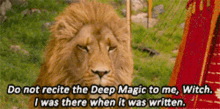
#dnd#wizards of the coast#wotc#ttrpg#d&d#dungeons and dragons#paizo#paizo publishing#pathfinder#ogl 1.1#ogl#orc#orc license
183 notes
·
View notes
Text
Given the situation with the Open Game License going on right now I think it's best if independent tabletop game developers talk to lawyers right away. Whether they have or haven't used D&D related content under the OGL they should still prepare for litigation. Paizo, Green Ronin Publishing, Kobald Press, Ghostfire Games, White Wolf, Fantasy Flight, any and all indie devs should prepare. And if possible they should contact and work together, unite against Hasbro and WotC.
#wizards of the coast#wotc#hasbro#dungeons and dragons#dnd#d&d#pathfinder#paizo#green ronin#fantasy age#mutants and masterminds#kobald press#ghostfire games#white wolf#call of cthulhu#ogl#open game license#opendnd
194 notes
·
View notes
Text
(Someone asked for my thoughts about the current OGL debacle, and compared it to how TSR handled its properties in its final years as a company; Tumblr twice ate my reply and deleted the original question)
From the earliest days of D&D a big part of its appeal has been the way it encourages players to create and share their own worlds. The initial appearance of the game sparked the rise of a host of amateur fanzines and third-party small press publishers whose efforts helped increase the popularity of TSR's core product. As TSR grew, it extended various licenses for official supplements, with an uneasy tolerance of ‘generic’ material that didn’t claim to be official.
As competition increased, Gygax seemed more irritated with others engaging with his game on their own terms. Instead of writing as much about imagination and creativity he often focused on promoting the right way to play. He wasted pages of space in Dragon magazine railing against the small presses and accusing them of making inferior unauthorized products that deceived unsuspecting gamers in the marketplace.
After forcing Gygax out in the mid-80s, Lorraine Williams saved TSR through aggressive expansion, but an attempt at total market dominance helped cause its final financial crisis in the 90s. The company produced too many of its own new games and official supplements split between too many different genres and campaign worlds, dividing its own customer base among an unsustainable number of products that competed with each other.
That was back then. As for now, I think:
As a consumer of some recent third-party content for 5e and B/X D&D I've been pretty happy with the thriving community of creators making free and commercial supplements, and I hope no one tries to place roadblocks in their way.
That’s about it. I think I'm not the best person to comment on the details of the allegedly more restrictive leaked OGL 1.1 because:
I have no inside information or contacts with the legal representation of Hasbro, Inc, and
I myself am not a publisher of OGL-based material who would be directly threatened with financial loss by any of the changes that might occur.
It's understandable that independent authors and publishers would be worried about a possible threat to their businesses. It is especially concerning that the company at the center of all this has mostly remained silent for several weeks while anger and fear has been amplified. The last official statement was back on December 21, in which they insisted that independent creators would still be able to keep doing what they have been doing, and mentioned new threats like NFTs as an example of why they felt the old legal language needed an update:
https://www.dndbeyond.com/posts/1410-ogls-srds-one-d-d
Unfortunately when I see this topic being promoted on Twitter and YouTube, many of the top suggestions are clearly bad-faith click-bait performance art by people selling anger as entertainment, which isn’t going to help anyone understand the actual issues. I won’t engage with the worst of those.
There are some good takes on the topic here -- @mostlysignssomeportents explained some reasons why publishers probably never needed the OGL and could be better off without it, and @prokopetz has some observations on why the OGL made people more comfortable about quoting the official rules and where things might be headed.
#not going to make this a regular thing here#gaming history#open gaming license#OGL 1.1#OGL#D&D#dnd#Dungeons & Dragons#One D&D#WOTC#Hasbro
132 notes
·
View notes